News
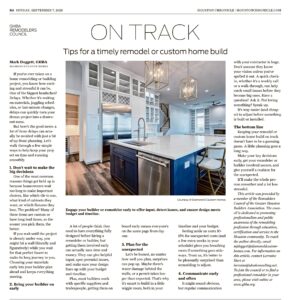
This article “Tips for a Timely Remodel or Custom Home Build” was written by Mark Doggett and published in the September 7, 2025 Sunday edition of the Houston Chronicle.
If you’ve ever taken on a home remodeling or building project, you know how exciting and stressful it can be. One of the biggest headaches? Delays. Whether it’s waiting on materials, juggling schedules, or last-minute changes, delays can quickly turn your dream project into a drawn-out mess.
But here’s the good news: a lot of those delays can actually be avoided with just a bit of upfront planning. Let’s walk through a few simple ways to help keep your project on time and running smoothly.
- Don’t Wait to Make the Big Decisions
One of the most common reasons things get held up is because homeowners wait too long to make important choices, like which tile to use, what kind of cabinets they want, or which fixtures they love. The problem? Many of these items are custom or have long lead times, so the sooner you pick them, the better.
If you wait until the project is already underway, you might hit a wall (literally and figuratively) while you wait for that perfect faucet to make its long journey to you. Choosing your materials early lets your builder plan ahead and keeps everything moving.
- Bring Your Builder on Early
A lot of people think they need to have everything fully designed before hiring a remodeler or builder, but getting them involved early can actually save time and money. They can give helpful input, spot potential issues, and make sure your design lines up with your budget and timeline.
Plus, most builders work with specific suppliers and tradespeople, getting them on board early means everyone’s on the same page from day one.
- Plan for the Unexpected
Let’s be honest, no matter how well you plan, surprises can pop up. Maybe there’s water damage behind the walls, or a permit takes longer than expected. That’s why it’s smart to build in a little wiggle room, both in your timeline and your budget.
Setting aside an extra 10–15% for unexpected costs (and a few extra weeks in your schedule) gives you breathing room if something goes sideways. Trust us, it’s better to be pleasantly surprised than scrambling to adjust.
- Communicate Early and Often
It might sound obvious, but regular communication with your contractor is huge. Don’t assume they know your vision unless you’ve spelled it out. A quick check-in, whether it’s a weekly call or a walk-through, can help catch small issues before they become big ones. Have a question? Ask it. Not loving something? Speak up. It’s way easier (and cheaper) to adjust before something is built or installed.
The Bottom Line
Keeping your remodel or custom home build on track doesn’t have to be a guessing game. A little planning goes a long way. Make your key decisions early, get your remodeler or builder involved sooner, and give yourself a cushion for the unexpected. It’ll make the whole process smoother and a lot less stressful.
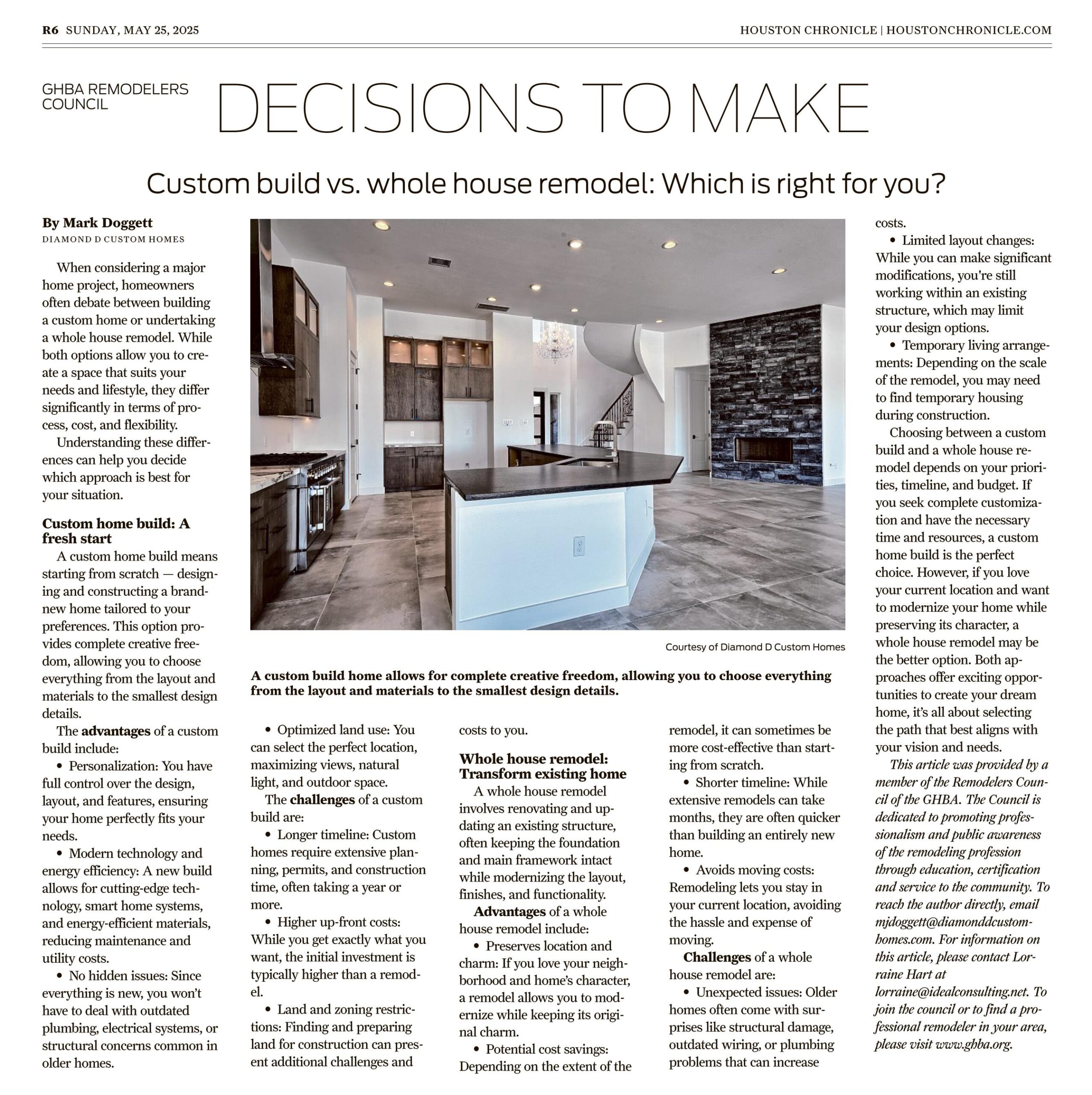
This article “Custom Build vs Whole House Remodel” was written by Mark Doggett and published in the May 25, 2025 Sunday edition of the Houston Chronicle.
When considering a major home project, homeowners often debate between building a custom home or undertaking a whole house remodel. While both options allow you to create a space that suits your needs and lifestyle, they differ significantly in terms of process, cost, and flexibility.
Understanding these differences can help you decide which approach is best for your situation.
Custom Home Build: A Fresh Start
A custom home build means starting from scratch—designing and constructing a brand-new home tailored to your preferences. This option provides complete creative freedom, allowing you to choose everything from the layout and materials to the smallest design details.
Advantages of a Custom Build:
- Personalization: You have full control over the design, layout, and features, ensuring your home perfectly fits your needs.
- Modern Technology & Energy Efficiency: A new build allows for cutting-edge technology, smart home systems, and energy-efficient materials, reducing maintenance and utility costs.
- No Hidden Issues: Since everything is new, you won’t have to deal with outdated plumbing, electrical systems, or structural concerns common in older homes.
- Optimized Land Use: You can select the perfect location, maximizing views, natural light, and outdoor space.
Challenges of a Custom Build:
- Longer Timeline: Custom homes require extensive planning, permits, and construction time, often taking a year or more.
- Higher Upfront Costs: While you get exactly what you want, the initial investment is typically higher than a remodel.
- Land & Zoning Restrictions: Finding and preparing land for construction can present additional challenges and costs.
Whole House Remodel: Transforming an Existing Home
A whole house remodel involves renovating and updating an existing structure, often keeping the foundation and main framework intact while modernizing the layout, finishes, and functionality.
Advantages of a Whole House Remodel:
- Preserves Location & Charm: If you love your neighborhood and home’s character, a remodel allows you to modernize while keeping its original charm.
- Potential Cost Savings: Depending on the extent of the remodel, it can sometimes be more cost-effective than starting from scratch.
- Shorter Timeline: While extensive remodels can take months, they are often quicker than building an entirely new home.
- Avoids Moving Costs: Remodeling lets you stay in your current location, avoiding the hassle and expense of moving.
Challenges of a Whole House Remodel:
- Unexpected Issues: Older homes often come with surprises like structural damage, outdated wiring, or plumbing problems that can increase costs.
- Limited Layout Changes: While you can make significant modifications, you’re still working within an existing structure, which may limit your design options.
- Temporary Living Arrangements: Depending on the scale of the remodel, you may need to find temporary housing during construction.
Choosing between a custom build and a whole house remodel depends on your priorities, timeline, and budget. If you seek complete customization and have the necessary time and resources, a custom home build is the perfect choice. However, if you love your current location and want to modernize your home while preserving its character, a whole house remodel may be the better option. Both approaches offer exciting opportunities to create your dream home, it’s all about selecting the path that best aligns with your vision and needs.
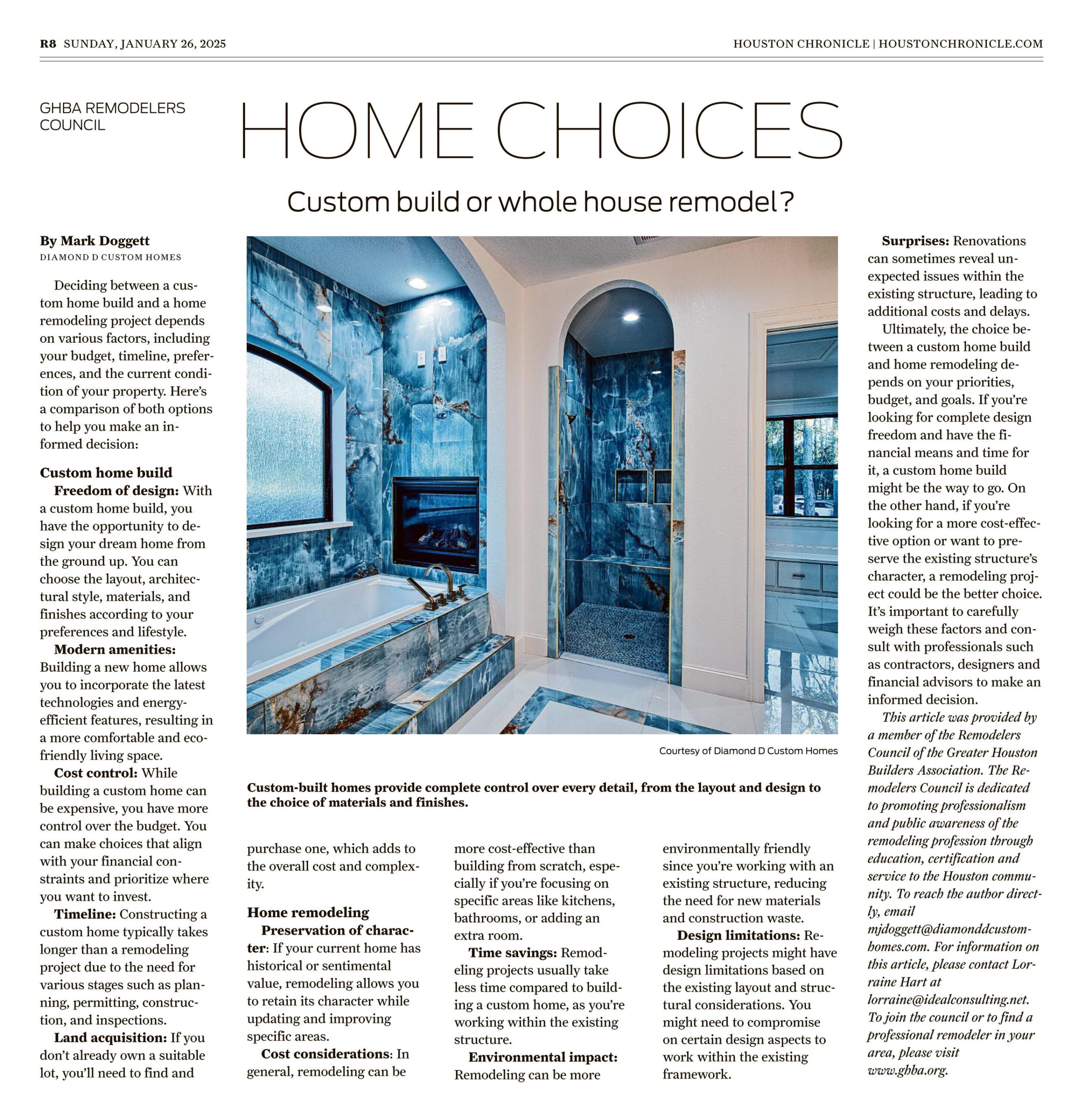
This article “Custom Build vs Whole House Remodel”was written by Mark Doggett and published in the January 26, 2025 Sunday edition of the Houston Chronicle.
Deciding between a custom home build and a home remodeling project depends on various factors, including your budget, timeline, preferences, and the current condition of your property. Here’s a comparison of both options to help you make an informed decision:
Custom Home Build:
Freedom of Design: With a custom home build, you have the opportunity to design your dream home from the ground up. You can choose the layout, architectural style, materials, and finishes according to your preferences and lifestyle.
Modern Amenities: Building a new home allows you to incorporate the latest technologies and energy-efficient features, resulting in a more comfortable and eco-friendly living space.
Cost Control: While building a custom home can be expensive, you have more control over the budget. You can make choices that align with your financial constraints and prioritize where you want to invest.
Timeline: Constructing a custom home typically takes longer than a remodeling project due to the need for various stages such as planning, permitting, construction, and inspections.
Land Acquisition: If you don’t already own a suitable lot, you’ll need to find and purchase one, which adds to the overall cost and complexity.
Home Remodeling:
Preservation of Character: If your current home has historical or sentimental value, remodeling allows you to retain its character while updating and improving specific areas.
Cost Considerations: In general, remodeling can be more cost-effective than building from scratch, especially if you’re focusing on specific areas like kitchens, bathrooms, or adding an extra room.
Time Savings: Remodeling projects usually take less time compared to building a custom home, as you’re working within the existing structure.
Environmental Impact: Remodeling can be more environmentally friendly since you’re working with an existing structure, reducing the need for new materials and construction waste.
Design Limitations: Remodeling projects might have design limitations based on the existing layout and structural considerations. You might need to compromise on certain design aspects to work within the existing framework.
Surprises: Renovations can sometimes reveal unexpected issues within the existing structure, leading to additional costs and delays.
Ultimately, the choice between a custom home build and home remodeling depends on your priorities, budget, and goals. If you’re looking for complete design freedom and have the financial means and time for it, a custom home build might be the way to go. On the other hand, if you’re looking for a more cost-effective option or want to preserve the existing structure’s character, a remodeling project could be the better choice. It’s important to carefully weigh these factors and consult with professionals such as contractors, designers and financial advisors to make an informed decision.
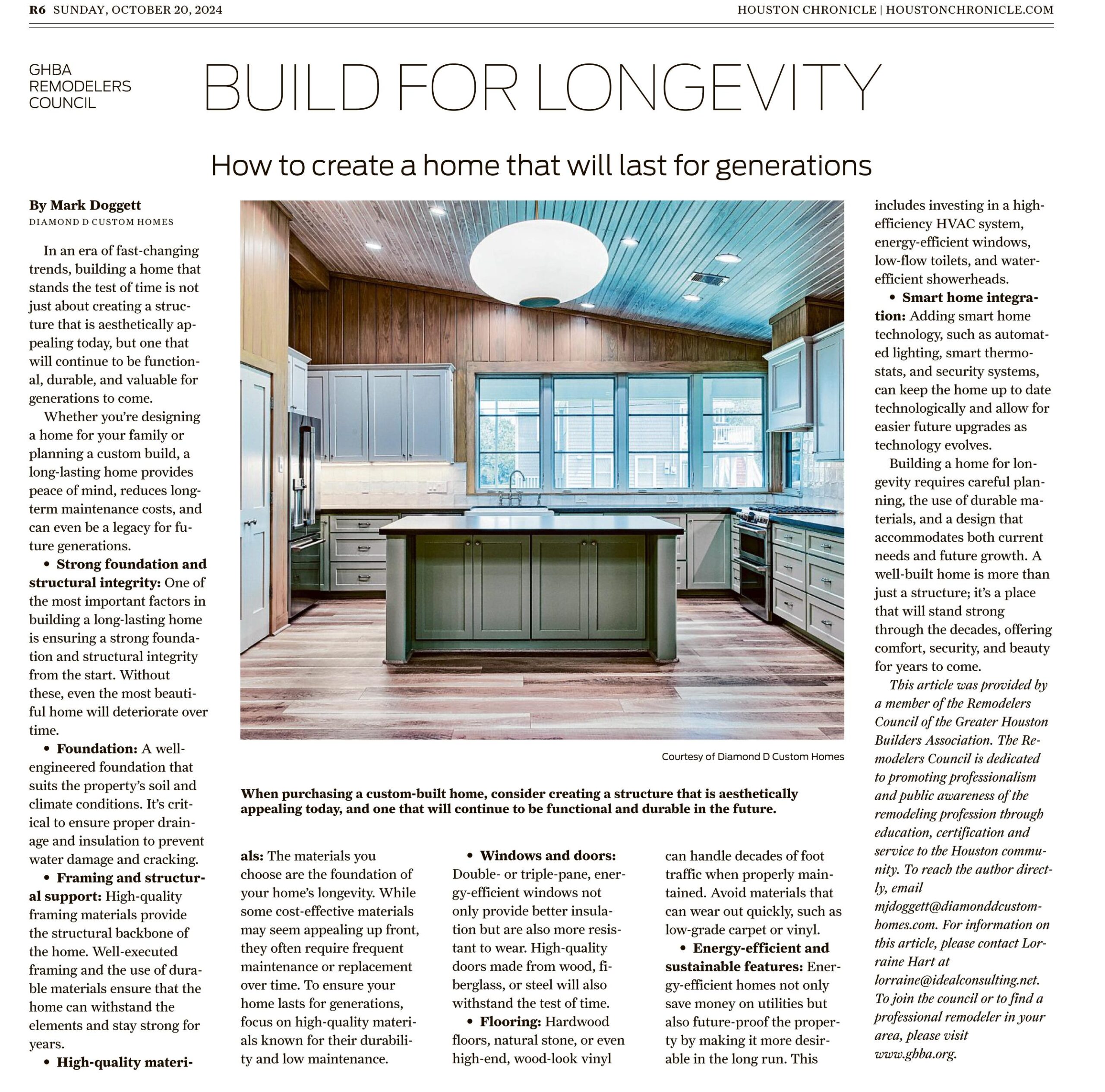
This article was written by Mark Doggett and published in the October 20, 2024 Sunday edition of the Houston Chronicle.
In an era of fast-changing trends, building a home that stands the test of time is not just about creating a structure that is aesthetically appealing today, but one that will continue to be functional, durable, and valuable for generations to come. Whether you’re designing a home for your family or planning a custom build, a long-lasting home provides peace of mind, reduces long-term maintenance costs, and can even be a legacy for future generations.
Strong Foundation and Structural Integrity
One of the most important factors in building a long-lasting home is ensuring a strong foundation and structural integrity from the start. Without these, even the most beautiful home will deteriorate over time.
Foundation
A well-engineered foundation that suits the property’s soil and climate conditions. It’s critical to ensure proper drainage and insulation to prevent water damage and cracking.
Framing and Structural Support
High-quality framing materials provide the structural backbone of the home. Well-executed framing and the use of durable materials ensure that the home can withstand the elements and stay strong for years.
High-Quality Materials
The materials you choose are the foundation of your home’s longevity. While some cost-effective materials may seem appealing upfront, they often require frequent maintenance or replacement over time. To ensure your home lasts for generations, focus on high-quality materials known for their durability and low maintenance.
Windows and Doors
Double or triple-pane energy-efficient windows not only provide better insulation but are also more resistant to wear. High-quality doors made from wood, fiberglass, or steel will also withstand the test of time.
Flooring
Hardwood floors, natural stone, or even high-end wood-look vinyl can handle decades of foot traffic when properly maintained. Avoid materials that can wear out quickly, such as low-grade carpet or vinyl.
Energy-Efficient and Sustainable Features
Energy-efficient homes not only save money on utilities but also future-proof the property by making it more desirable in the long run. This includes investing in a high-efficiency HVAC system, energy-efficient windows and low-flow toilets, and water-efficient showerheads.
Smart Home Integration
Adding smart home technology, such as automated lighting, smart thermostats, and security systems, can keep the home up to date technologically and allow for easier future upgrades as technology evolves.
Building a home for longevity requires careful planning, the use of durable materials, and a design that accommodates both current needs and future growth. A well-built home is more than just a structure; it’s a place that will stand strong through the decades, offering comfort, security, and beauty for years to come.
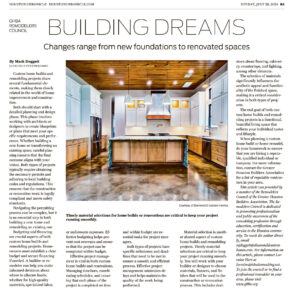
This article “Building Dreams: From New Foundations to Renovated Spaces” written by Mark Doggett was published in the July 28, 2024 Sunday edition of the Houston Chronicle.
Custom home builds and remodeling projects share several fundamental elements, making them closely related in the world of home improvement and construction. Both should start with a detailed planning and design phase. This phase involves working with architects or designers to create blueprints or plans that meet your specific requirements and preferences. Whether building a new home or transforming an existing space, careful planning ensures that the final outcome aligns with your vision.
Both types of projects typically require obtaining the necessary permits and adhering to local building codes and regulations. This ensures that the construction or renovation work is legally compliant and meets safety standards. Navigating the permitting process can be complex, but it is an essential step in both building a new home and remodeling an existing one.
Budgeting and financing are crucial aspects of both custom home builds and remodeling projects. Homeowners must establish a clear budget and secure financing if needed. A builder or remodeler can help you make informed decisions about where to allocate funds, whether for high-quality materials, specialized labor, or unforeseen expenses. Effective budgeting helps prevent cost overruns and ensures that the project can be completed within budget.
Effective project management is vital in both custom home builds and renovations. Managing timelines, coordinating schedules, and ensuring that each phase of the project is completed on time and within budget are essential tasks for project managers. Both types of projects have specific milestones and deadlines that need to be met to ensure a smooth and efficient process. Effective project management minimizes delays and helps maintain the quality of the work being performed.
Material selection is another shared aspect of custom home builds and remodeling projects. Timely material selections are critical to keep your project running smoothly. You will work with your builder or designer to choose materials, fixtures, and finishes that will be used in the construction or renovation process. This includes decisions about flooring, cabinetry, countertops, and lighting, among other elements. The selection of materials significantly influences the aesthetic appeal and functionality of the finished space, making it a critical consideration in both types of projects.
The end goal of both custom home builds and remodeling projects is a functional, beautiful living space that reflects your individual tastes and lifestyle.
When planning a custom home build or home remodel, do your homework to ensure that you are hiring a reputable, qualified individual or company. For more information you can contact the Greater Houston Builders Association for a list of reputable contractors in your area.

The following article was published in the Sunday, May 19th 2024 edition of the Houston Chronicle.
How to choose? It depends on what you want!
When you build a custom home aka your “dream home”, you have a blank slate to design your ideal living space in the location you desire. You have control over all the decisions from the floor plan layout to the types of finishes that will be used.
The Advantages of Building a Custom Home:
- Have it your way! A custom-built home can be personalized to reflect your personality, tastes, and preferences.
- With a brand-new home, everything will be under warranty which means less maintenance issues.
- A new custom home allows you to use sustainable materials to design an environmentally and energy efficient home. Sustainable materials offer a way to reduce the environmental impact of construction and remodeling projects by conserving natural resources, minimizing waste, and lowering carbon emissions.
- When designing a new custom home, you can include smart technology features for better functionality.
The Disadvantages of Building Your Custom Home
- It usually costs more to build a new custom home than to renovate an existing one for reasons including site preparation, permitting, regulatory compliance and architectural design fees.
- New landscaping may be an extra cost.
- A new custom home may take longer to build than renovating your current home. Building a new custom home from the ground up involves multiple stages of construction, including foundation, framing, roofing, electrical, plumbing, HVAC, insulation, drywall, and finishing work. Each stage requires careful coordination and may take several weeks or months to complete, depending on the size and complexity of the home.
- Lastly, you might want to stay in the home you’re already in because it’s full of memories and you love your neighborhood.
Advantages of a Home Remodel
- A home remodel allows you to transform your home into the home of your dreams by making modifications to meet your current lifestyle needs.
- Depending on the improvements you make, you can boost the value of your home.
- A home remodel may allow you to have a more open layout or, depending upon your property, to add additional space either by building out or up.
The Disadvantages of a Home Remodel
- Sometimes when remodeling a whole house, problems can be uncovered when knocking down walls or with the home’s structure which can result in unexpected costs. We’ve all seen this happen on various home remodeling tv shows.
- Remodeling a home can be a time-consuming job and may be challenging to live through. If possible, you may be able to designate specific areas of the house where you can live comfortably while the remodel is underway. This might mean setting up a temporary kitchen, bathroom, and sleeping area in parts of the house that are not being renovated.
- There may be limitations on how much space and functionality you can achieve in your current home. You may find that changes that you want to make to your layout are not possible or may put you over budget.
No matter what changes in your life, a custom home can meet those changes while a home renovation can also make it possible to have the home of your dreams!
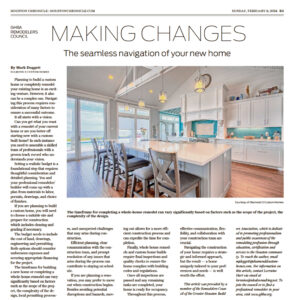
This article was written by Mark Doggett published in the February 11, 2024 Sunday edition of the Houston Chronicle.
Planning to build a custom home or completely remodel your existing home is an exciting venture. However, it also can be a complex one. Navigating this process requires consideration of many factors to ensure a successful outcome.
It all starts with a vision. Can you get what you want with a remodel of your current home or are you better off starting new with a custom-built home? In each instance you need to assemble a skilled team of professionals with a proven track who understands your vision.
Setting a realistic budget is a foundational step that requires thoughtful consideration and detailed planning. You and your professional Remodeler/Builder will come up with a plan from materials to labor, permits, drawings, and choice of finishes. If you are planning to build a custom home, you will need to choose a suitable site and prepare for construction which includes clearing and grading if necessary. The budget needs to include the cost of land, drawings, engineering and permitting. Both options should consider unforeseen expenses and securing appropriate financing for the project.
The timeframe for building a new home or completing a whole-house remodel can vary significantly based on factors such as the scope of the project, the complexity of the design, local permitting processes, and unexpected challenges that may arise during construction. Efficient planning, clear communication with the construction team, and prompt resolution of any issues that arise during the process can contribute to staying on schedule.
If you are planning a renovation you may prefer to move out when construction begins. Besides avoiding potential disruptions and hazards, moving out allows for a more efficient construction process and can expedite the time for completion.
Finally, whole house remodels and custom home builds require final inspections and quality checks to ensure the home complies with building codes and regulations. Once all inspections are passed and any remaining tasks are completed, your home is ready for occupancy.
Throughout this process, effective communication, flexibility, and collaboration with your construction team are crucial. Navigating the construction of your home requires a strategic and informed approach, but the result—a home uniquely tailored to your preferences and needs—is well worth the effort.
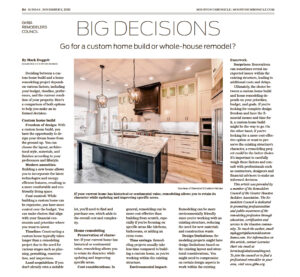
This article Custom Home Build vs Whole House Remodel was written by Mark Doggett and published in the Nov 5, 2023 Sunday edition of the Houston Chronicle.
Deciding between a custom home build and a home remodeling project depends on various factors, including your budget, timeline, preferences, and the current condition of your property. Here’s a comparison of both options to help you make an informed decision:
Custom Home Build:
Freedom of Design: With a custom home build, you have the opportunity to design your dream home from the ground up. You can choose the layout, architectural style, materials, and finishes according to your preferences and lifestyle.
Modern Amenities: Building a new home allows you to incorporate the latest technologies and energy-efficient features, resulting in a more comfortable and eco-friendly living space.
Cost Control: While building a custom home can be expensive, you have more control over the budget. You can make choices that align with your financial constraints and prioritize where you want to invest.
Timeline: Constructing a custom home typically takes longer than a remodeling project due to the need for various stages such as planning, permitting, construction, and inspections.
Land Acquisition: If you don’t already own a suitable lot, you’ll need to find and purchase one, which adds to the overall cost and complexity.
Home Remodeling:
Preservation of Character: If your current home has historical or sentimental value, remodeling allows you to retain its character while updating and improving specific areas.
Cost Considerations: In general, remodeling can be more cost-effective than building from scratch, especially if you’re focusing on specific areas like kitchens, bathrooms, or adding an extra room.
Time Savings: Remodeling projects usually take less time compared to building a custom home, as you’re working within the existing structure.
Environmental Impact: Remodeling can be more environmentally friendly since you’re working with an existing structure, reducing the need for new materials and construction waste.
Design Limitations: Remodeling projects might have design limitations based on the existing layout and structural considerations. You might need to compromise on certain design aspects to work within the existing framework.
Surprises: Renovations can sometimes reveal unexpected issues within the existing structure, leading to additional costs and delays.
Ultimately, the choice between a custom home build and home remodeling depends on your priorities, budget, and goals. If you’re looking for complete design freedom and have the financial means and time for it, a custom home build might be the way to go. On the other hand, if you’re looking for a more cost-effective option or want to preserve the existing structure’s character, a remodeling project could be the better choice. It’s important to carefully weigh these factors and consult with professionals such as contractors, designers and financial advisors to make an informed decision.
Diamond D Custom Homes is a proud winner of the Baytown Sun community newspaper’s annual Best of the Best 2018 Readers’ Choice award in the Home Builder/Remodeler category. The Readers’ Choice awards is an annual contest which invites readers to weigh in on which businesses and individuals they think are the best in over 170 different business categories.
Diamond D Custom Homes is a proud runner-up of the Baytown Sun community newspaper’s annual Best of the Best 2017 Readers’ Choice award in the Home Builder category. The Readers’ Choice awards is an annual contest which invites readers to weigh in on which businesses and individuals they think are the best in over 170 different business categories.
